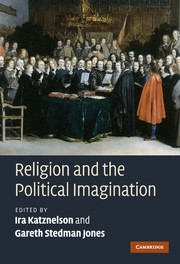Book contents
- Frontmatter
- Contents
- List of contributors
- Acknowledgements
- Introduction: multiple secularities
- 1 Secularisation: religion and the roots of innovation in the political sphere
- 2 Regarding toleration and liberalism: considerations from the Anglo-Jewish experience
- 3 The Enlightenment, the late eighteenth-century revolutions and their aftermath: the ‘secularising’ implications of Protestantism?
- 4 In the lands of the Ottomans: religion and politics
- 5 The Russian Orthodox Church and secularisation
- 6 The American experience of secularisation
- 7 French Catholic political thought from the deconfessionalisation of the state to the recognition of religious freedom
- 8 Religion and the origins of socialism
- 9 From 1848 to Christian Democracy
- 10 The disciplining of the religious conscience in nineteenth-century British politics
- 11 Colonial secularism and Islamism in North India: a relationship of creativity
- 12 The 1960s
- 13 Gendering secularisation: locating women in the transformation of British Christianity in the 1960s
- 14 Does constitutionalisation lead to secularisation?
- 15 Europe's uneasy marriage of secularism and Christianity since 1945 and the challenge of contemporary religious pluralism
- 16 On thick and thin religion: some critical reflections on secularisation theory
- Index
4 - In the lands of the Ottomans: religion and politics
Published online by Cambridge University Press: 05 June 2012
- Frontmatter
- Contents
- List of contributors
- Acknowledgements
- Introduction: multiple secularities
- 1 Secularisation: religion and the roots of innovation in the political sphere
- 2 Regarding toleration and liberalism: considerations from the Anglo-Jewish experience
- 3 The Enlightenment, the late eighteenth-century revolutions and their aftermath: the ‘secularising’ implications of Protestantism?
- 4 In the lands of the Ottomans: religion and politics
- 5 The Russian Orthodox Church and secularisation
- 6 The American experience of secularisation
- 7 French Catholic political thought from the deconfessionalisation of the state to the recognition of religious freedom
- 8 Religion and the origins of socialism
- 9 From 1848 to Christian Democracy
- 10 The disciplining of the religious conscience in nineteenth-century British politics
- 11 Colonial secularism and Islamism in North India: a relationship of creativity
- 12 The 1960s
- 13 Gendering secularisation: locating women in the transformation of British Christianity in the 1960s
- 14 Does constitutionalisation lead to secularisation?
- 15 Europe's uneasy marriage of secularism and Christianity since 1945 and the challenge of contemporary religious pluralism
- 16 On thick and thin religion: some critical reflections on secularisation theory
- Index
Summary
Introduction
While the relationship between religion and politics has always been interesting to scholars, its study has acquired a special urgency in the last decade. This urgency is associated with the rise of fundamentalism within different religions, the increasing use of the religious idiom in politics and the apparent reversal of the long-standing secularisation thesis. While the belief that secularisation had become the way of the world has been strong since the late nineteenth century, careful study of the relationship between religion and politics actually shows that religion remained in the social and political realm and that secularisation did not destroy but instead based itself on particular state–church arrangements. Today, as we experience a resurgence of the religious idiom, the relationship between religion and politics has become as controversial as it is urgent, requiring scrutiny in a variety of contexts, time periods and political formations. As we move towards more in-depth analytic studies of how religion and politics perform, we need to treat them as separate institutional frames, paying attention to the different relations engendered at different times and in different contexts while remaining faithful to the idea that processes of institutional continuity and change are both equally possible.
The changing position of religion in modern Turkey and its predecessor, the Ottoman Empire, presents an excellent case study of a negotiated and contested relationship between religion and politics.
- Type
- Chapter
- Information
- Religion and the Political Imagination , pp. 90 - 111Publisher: Cambridge University PressPrint publication year: 2010
- 3
- Cited by



